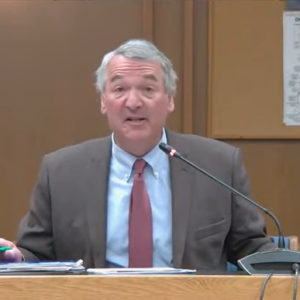Are Education Freedom Accounts a way to rescue children from failing local schools?
Or are they part of a plot by a libertarian cabal to bring anti-government activists in their childbearing years to the Granite State to impose their liberty-driven political will?
It was no surprise when a Senate proposal to expand EFA eligibility advanced through the GOP-controlled House Education Finance Committee on a party-line vote. But conspiratorial attacks on the popular program from ranking Democrat Rep. David Luneau (D-Hopkinton) raised eyebrows.
Luneau, an outspoken opponent of parental choice, launched a lengthy tirade during Thursday’s hearing, denouncing the EFA program as a “voucher scam” and tying it to the libertarian Free State Project.
He told fellow House members he suspects the EFA scholarship program “is really turning into a recruiting tool to bring in ‘Free State freeloaders’ into the state of New Hampshire.”
“By dangling free money to people who weren’t going to enroll in public schools to begin with, maybe we get some people who will move into the state that continue to elect people to local and state government positions that will put in place these sorts of draconian policies,” Luneau said. “They seek to, in my opinion, destroy the state that I know and love.”
Are EFAs an attempt to impact the demographics of New Hampshire and “destroy” the state?
Some found it far-fetched.
“That’s just ridiculous rhetoric,” said Rep. Raymond Peeples (R-Litchfield).
State Sen. Dan Innis (R-Bradford), Vice Chair of the Education Finance Committee, responded, “‘The Truth Is Out There,’ Rep. Luneau…”
Conspiracy or not, SB 295 now heads to the floor with a recommendation of “ought-to-pass” thanks to Republicans’ 10-8 committee majority.
Under current law, families that earn more than 350 percent of the federal poverty level, or about $112,000 for a family of four, aren’t eligible to participate.
SB 295, sponsored by state Sen. Victoria Sullivan (R-Manchester), would eliminate income eligibility requirements within 60 days of the bill being signed into law. The House’s version, HB 115, would phase in universal eligibility within the next two school years.
Gov. Kelly Ayotte supports EFAs, but has stopped short of calling for immediate universal eligibility. She has previously suggested eligibility for new enrollees above the income threshold might be limited to students already in the public school system — an attempt to keep parents already paying for public school from using public money to cover part of the costs.
During her testimony last month, Sullivan ripped Democrats for deploying the term “voucher,” which she insisted is derogatory and inaccurate.
On Thursday, Luneau appeared to be referencing Sullivan with his remarks.
“Even today, I can pick up the ire and the bristling people have when I refer to it as a voucher program,” he said. “And you know what? I’m going to admit it’s not a voucher program. It’s a voucher scam.”
Reached by NHJournal and asked to respond to Luneau’s comments, Sullivan offered the Hopkinton Democrat some political advice.
“Referring to taxpayers as ‘freeloaders’ is not a great political move.”
Sullivan said Luneau’s comments about the EFA program and its goals are “insulting to the families who use these accounts.”
Eric Brakey, executive director of the New Hampshire Free State Project, responded to Luneau’s comments by agreeing with one part of his premise: Good government policy will make the state more popular, particularly for people seeking more personal freedom.
“School choice, gun rights, and low taxes — all of these policies contribute to New Hampshire being ranked #1 for freedom and are reasons why Free Staters move to New Hampshire,” Brakey told NHJournal.
During Thursday’s hearing, Republicans noted taxpayer funding of public schools has soared even as enrollment has fallen. And yet, despite spending more than $22,000 per pupil, student academic performance has remained flat. Reforms like EFAs can spur excellence, they argued.
“This is about parental choice. This is not ‘anti-public school,'” said Rep. Jim Kofalt (R-Wilton). “It is pro-families choosing what’s best for their kids.”
But state Rep. Tracy Bricchi (D-Penacook) countered that many EFA families never enrolled their children “in a public school to begin with, so how can we say they are failing?”
State Rep. Daniel Popovici-Muller (R-Windham) accused the program’s opponents of hypocrisy.
“I’m surprised to see that a program that’s basically designed to bring equity by making sure every child has access to some state education funds is facing opposition like this,” he said. “I guess for some of you, equity is a scam.
“If you feel you don’t deserve those funds, please, do not apply for an EFA,” Popovici-Muller said.
State Rep. Dick Ames (D-Jaffrey) criticized the timing of a potential expansion.
“We all know we have a budget problem,” he said. “We face a situation apart from this bill where we’re not able to meet fundamental needs.”
Kate Baker Demers, executive director of the Children’s Scholarship Fund of New Hampshire — authorized by the state to administer the EFA program — praised the results of Thursday’s vote.
“Families are grateful and relieved that the House Education Funding Committee voted to expand the award winning EFA program,” she said. “By making the popular Education Freedom Account program open to all families, all children will have access to the education that is the right fit for them to realize their unique potential.”
As for Luneau’s theory that the EFAs are an underground effort to destroy the Granite State, House Majority Leader Jason Osborne offered a response.
“I agree with House Democrats that, while they promote policies welcoming and harboring MS13 gang members and other assorted illegal aliens to spread fentanyl and endanger our communities, Republican policies attract libertarians to (gasp!) mind their own business and leave you alone.”





